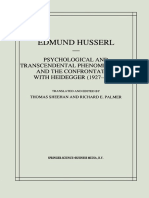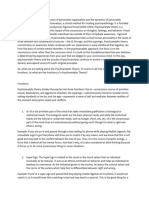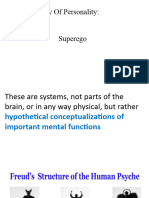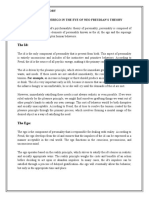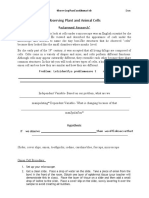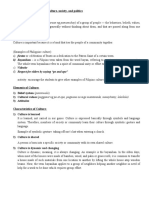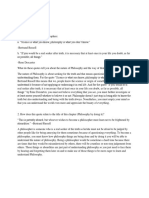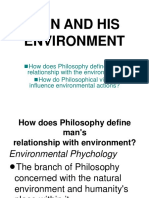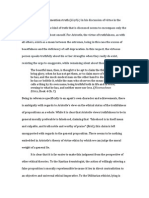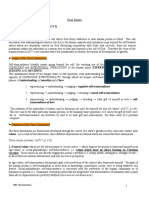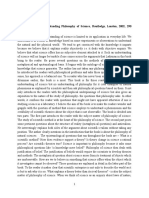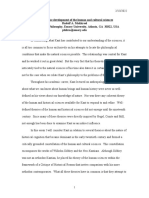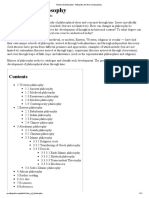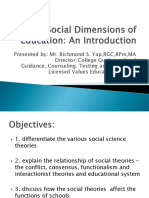(DISS 5) PSYCHOANALYSIS Students'
(DISS 5) PSYCHOANALYSIS Students'
Uploaded by
AndreiCopyright:
Available Formats
(DISS 5) PSYCHOANALYSIS Students'
(DISS 5) PSYCHOANALYSIS Students'
Uploaded by
AndreiOriginal Title
Copyright
Available Formats
Share this document
Did you find this document useful?
Is this content inappropriate?
Copyright:
Available Formats
(DISS 5) PSYCHOANALYSIS Students'
(DISS 5) PSYCHOANALYSIS Students'
Uploaded by
AndreiCopyright:
Available Formats
DISCIPLINES AND IDEAS IN THE SOCIAL SCIENCES
PSYCHOANALYSIS (LESSON 5)
Psychoanalysis, which traces its roots to psychologist Sigmund Freud, means “analysis of
the mind.”
If you were given the chance to choose between having an iPhone X and saving the money
for next semester’s enrolment, which will you choose? How will you weigh your decision? Will
you desire what pleasures you or choose otherwise leaving you free from guilt?
When we seek to satisfy our pleasure, we are operating in the reservoir of our instincts,
which is known as the id. Id according to Sigmund Freud is vitally and directly related to the
satisfaction of bodily needs. By satisfying desires, the id aims to reduce tension because it has
no contact with reality. Id also operates from raw and irrational impulses and fuelled by
pleasure principle that aims to be fulfilled through the acquisition of the need satisfying objects.
To put it lightly, id is the driving force to enjoy life, as the youngsters say “YOLO” (You Only Live
Once).
In the absence of what pleasure us we seek for alternatives in dealing with our stressors and
this is where the ego lies. The ego develops sometime after the infant is born and its function is
to temper the id by finding socially acceptable ways of meeting the needs. It is the only region
of the mind in contact with reality and it is a person’s sole source of communication with the
external world. This is best illustrated in diverting our aggressive emotions into more
constructive and acceptable ways.
Constructive and acceptable ways of expressing our desires are a product of our conformity
with the society’s notion of right and wrong. We develop what is morally known as conscience,
an idealistic principle. In the Freudian psychology, it is known as the superego, which is the
unrealistic demand for perfection.
Id, ego, superego is the structure of personality where one exist because of the other. Id
seeks to be fulfilled, while ego looks for an alternative and acceptable ways of expressing
desires. Superego on the other hand tempers desires in the morally perfectionist ways.
Id – pleasure
Ego – realistic
Superego – idealistic
Id to Superego and Ego: “I want to steal.”
Superego to Id: “You should not steal.”
Ego to Id: “You will go to jail.”
EVALUATION:
A. Read the passages below. Identify the principle operating with the decision employed by
the main character.
1. Banjo needs money for his project in order to pass the subject. On his way home, he
found a wallet that has money more than enough for his expenses. He was torn on
spending the money and returning it to the rightful owner. He chooses to return the
wallet because he remembered that it is how he was brought up.
2. Martina wanted to join her friends in their swimming. However, she knew that her
parents will not allow her. She told her parents that they will have group project that
needs to be submitted.
3. Amir knew that he has aggressive tendencies. He is easily angered. He wanted to
minimize his bad feelings about it so he joined the Karate Club.
B. If you are part of the LGBT community what will be your stand on the issue of “Same Sex
Marriage”. Your answer should be based on the three principles of psychodynamics of
human personality which are: pleasure (id), realistic (ego), or idealistic (superego)
principle.
a. Pleasure (Id)
b. Realistic (Ego)
c. Idealistic (Superego)
You might also like
- Fuzzy Logic With Engineering Applications Third Edition Solution ManualDocument3 pagesFuzzy Logic With Engineering Applications Third Edition Solution ManualAndreiNo ratings yet
- Info-Online - Miami.edu-Fuzzy Logic Timothy J Ross Solution ManualDocument5 pagesInfo-Online - Miami.edu-Fuzzy Logic Timothy J Ross Solution ManualAndrei0% (2)
- Id Ego SuperegoDocument7 pagesId Ego SuperegoSupantha Bhattacharyya100% (1)
- Freud, S. (1920) - Beyond The Pleasure PrincipleDocument2 pagesFreud, S. (1920) - Beyond The Pleasure PrincipleGintare AdasiunaiteNo ratings yet
- Energy Forms and Changes TESTDocument9 pagesEnergy Forms and Changes TESTAndrei100% (2)
- Husserl, Edmund - Husserliana 6 Psychological and Transcendental Phenomenology and The Confrontation With Heidegger (1927-1931) PDFDocument515 pagesHusserl, Edmund - Husserliana 6 Psychological and Transcendental Phenomenology and The Confrontation With Heidegger (1927-1931) PDFsomebodyelses100% (2)
- Towards The Possible Integration of Psychology and Christian FaithDocument8 pagesTowards The Possible Integration of Psychology and Christian FaithKendrick L. BuchanNo ratings yet
- ORALDocument3 pagesORALrollenjhoNo ratings yet
- Id, Ego and Superego: What Is The Id (Or It) ?Document4 pagesId, Ego and Superego: What Is The Id (Or It) ?Carl Joseph AngelesNo ratings yet
- Id, Ego SupergoDocument6 pagesId, Ego SupergoNnil GnuamNo ratings yet
- PsychoanalysisDocument11 pagesPsychoanalysisEloisa Marie Enriquez BontilaoNo ratings yet
- Prelims: Philosophical Theories of The SelfDocument4 pagesPrelims: Philosophical Theories of The SelfJake Francis JarciaNo ratings yet
- Freud's Theory of PersonalityDocument4 pagesFreud's Theory of Personalityyy69225No ratings yet
- Psychology ProjectDocument13 pagesPsychology Projectshashank patelNo ratings yet
- Id Ego and Super Ego by FreudDocument3 pagesId Ego and Super Ego by FreudFrancisco Felipe Bacang100% (2)
- The structure of personality. FreudDocument5 pagesThe structure of personality. Freudriseva2002No ratings yet
- El Yo, El Ello y El Super YoDocument8 pagesEl Yo, El Ello y El Super YoModotti AidaNo ratings yet
- 2.2 ZONE: Personality Structure Freud's Id, Ego, and SuperegoDocument8 pages2.2 ZONE: Personality Structure Freud's Id, Ego, and SuperegoJco EmNo ratings yet
- Pyschoanalyss by Segmund FreudDocument25 pagesPyschoanalyss by Segmund FreudzhytottNo ratings yet
- Ego, Id and SuperegoDocument3 pagesEgo, Id and SuperegoMartha ShinganoNo ratings yet
- Id, Ego and SuperegoDocument2 pagesId, Ego and Superegotekley100% (1)
- Theories of SocializationDocument11 pagesTheories of SocializationAqdas RehmanNo ratings yet
- Structure of PersonalityDocument4 pagesStructure of PersonalityZoha ImranNo ratings yet
- Sigmond Freud-NotesDocument7 pagesSigmond Freud-NotesNarayanan ShankaraNo ratings yet
- Id, Ego, and Superego - Freud's Elements of PersonalityDocument5 pagesId, Ego, and Superego - Freud's Elements of PersonalityRyan Christopher C. LimNo ratings yet
- Theories and Approaches of Counseling and PsychotherapyDocument39 pagesTheories and Approaches of Counseling and PsychotherapyMWENDA JUSTINE E221/21605/2021No ratings yet
- The Id Ego and Superego.Document7 pagesThe Id Ego and Superego.Szayer Al MuqithNo ratings yet
- Part ADocument2 pagesPart AAzril HakimiNo ratings yet
- Id, Ego, Super EgoDocument2 pagesId, Ego, Super EgoCharleneGraceLim100% (1)
- Freud's Structure of PersonalityDocument7 pagesFreud's Structure of Personalityfernandaaraujocosta00No ratings yet
- Freud's Id, Ego, and Superego Definition and ExaDocument2 pagesFreud's Id, Ego, and Superego Definition and ExaJohn Lloyd RaborNo ratings yet
- The Id, Ego and Superego - Sigmund FreudDocument3 pagesThe Id, Ego and Superego - Sigmund FreudSheri-Lee_Smith100% (1)
- Id Ego Superego ThesisDocument8 pagesId Ego Superego Thesisfbzgmpm3100% (2)
- Chapter Six PersonalityDocument142 pagesChapter Six PersonalityaberaNo ratings yet
- Ego and Defence MechanismDocument9 pagesEgo and Defence MechanismJananee RajagopalanNo ratings yet
- Educational Psychology - Module 3 PDFDocument25 pagesEducational Psychology - Module 3 PDFMulenga Levy ChunguNo ratings yet
- The Id's DesiresDocument7 pagesThe Id's DesiresAmogh VarshaNo ratings yet
- Giving A Character Depth by Psychoanalystic TheoriesDocument6 pagesGiving A Character Depth by Psychoanalystic TheoriesrishiNo ratings yet
- RVA-UNIT-5.1Document5 pagesRVA-UNIT-5.1Ivy VillaNo ratings yet
- iBT Q4 09Document3 pagesiBT Q4 09erwincapiliNo ratings yet
- Objective 22 Describe The Structure of Personality As Freud Views It (Id, Ego, Superego), His Concept of Defense, and This Theory of DevelopmentDocument2 pagesObjective 22 Describe The Structure of Personality As Freud Views It (Id, Ego, Superego), His Concept of Defense, and This Theory of Developmentapi-316591997No ratings yet
- Psychoan Alytic Theory: Barro, Annie Francesca S. BSED31Document11 pagesPsychoan Alytic Theory: Barro, Annie Francesca S. BSED31Annie Francesca BarroNo ratings yet
- Psychodynamic PerspectivesDocument15 pagesPsychodynamic Perspectivesmana070201No ratings yet
- Id, Ego, and Superego - Understanding Freud's TheoryDocument5 pagesId, Ego, and Superego - Understanding Freud's TheoryRyan Christopher C. LimNo ratings yet
- Sigmund FreudDocument11 pagesSigmund FreudAbdulHamid GomampongNo ratings yet
- Freud's Persona-WPS OfficeDocument2 pagesFreud's Persona-WPS Officeclaridyltolete1814No ratings yet
- Sigmund Freuds Concept of SelfDocument6 pagesSigmund Freuds Concept of SelfTina ValdezNo ratings yet
- Psychoanalysis: Dominant Approaches and Ideas in The Social SciencesDocument14 pagesPsychoanalysis: Dominant Approaches and Ideas in The Social SciencesClien JustineNo ratings yet
- Components of PersonalityDocument2 pagesComponents of PersonalityJhon Kennhy Rogon MagsinoNo ratings yet
- Macbeth: Critical Theory: A Review of Critical Theory: Freud's Theory of Personality and FeminismDocument5 pagesMacbeth: Critical Theory: A Review of Critical Theory: Freud's Theory of Personality and Feminismultimatecombat92No ratings yet
- The Psychoanalytic Theory Was First Introduced by Sigmund FreudDocument1 pageThe Psychoanalytic Theory Was First Introduced by Sigmund FreuddenxolozadaNo ratings yet
- Psychoanalytic-WPS OfficeDocument1 pagePsychoanalytic-WPS OfficeLey ComoraNo ratings yet
- 4 Unit. Personality: Emotion Thought BehaviorDocument18 pages4 Unit. Personality: Emotion Thought BehaviorManoj PalNo ratings yet
- Id, Ego, Superego: The Structural Model of PersonalityDocument19 pagesId, Ego, Superego: The Structural Model of PersonalityErica Ayerde100% (1)
- Psychoanalytic Theory of PersonalityDocument41 pagesPsychoanalytic Theory of PersonalityBroccoli Chan100% (1)
- PsychoanalysisDocument21 pagesPsychoanalysisJosie DiolataNo ratings yet
- PERSONALITYDocument14 pagesPERSONALITYAfiya KhanNo ratings yet
- Freud'S Personality ComponentsDocument2 pagesFreud'S Personality ComponentsAra Mae MaglasangNo ratings yet
- Freud's TheoryDocument6 pagesFreud's Theoryjust passing byNo ratings yet
- Personality: Freud Psychoanalytic Theory: Defense MechanismsDocument10 pagesPersonality: Freud Psychoanalytic Theory: Defense MechanismsAadil JuttNo ratings yet
- The Id:: Neo Freudian'S Theory Id Ego and Superego in The Eye of Neo Freudian'S TheoryDocument3 pagesThe Id:: Neo Freudian'S Theory Id Ego and Superego in The Eye of Neo Freudian'S TheorySyed Raza Imam TirmaziNo ratings yet
- Freud's Psychoanalytic TheoryDocument3 pagesFreud's Psychoanalytic TheoryAhnNo ratings yet
- What Is The Sigmund Freud TheoryDocument4 pagesWhat Is The Sigmund Freud TheoryAbigail BalladaresNo ratings yet
- PDDocument35 pagesPDDevi ApriliaNo ratings yet
- Government of Tamil Nadu Directorate of Technical Education: Content/uploads/2020/04/dote-E-Lecture PDFDocument1 pageGovernment of Tamil Nadu Directorate of Technical Education: Content/uploads/2020/04/dote-E-Lecture PDFAndreiNo ratings yet
- Presentation 2Document7 pagesPresentation 2AndreiNo ratings yet
- Observing Plant and Animal CellsDocument3 pagesObserving Plant and Animal CellsAndreiNo ratings yet
- Finally Power DiodeDocument8 pagesFinally Power DiodeAndrei50% (2)
- USCP Lesson 8 (Groups) StudentsDocument1 pageUSCP Lesson 8 (Groups) StudentsAndreiNo ratings yet
- USCP Lesson 5a (Ethnocentrism and Cultural Relativism)Document1 pageUSCP Lesson 5a (Ethnocentrism and Cultural Relativism)AndreiNo ratings yet
- USCP Lesson 11 (Religion and Belief Systems) MyDocument5 pagesUSCP Lesson 11 (Religion and Belief Systems) MyAndreiNo ratings yet
- USCP Lesson 10 (Conformity and Deviance)Document2 pagesUSCP Lesson 10 (Conformity and Deviance)AndreiNo ratings yet
- USCP Lesson 5 (Ethnocentrism and Cultural Relativism)Document1 pageUSCP Lesson 5 (Ethnocentrism and Cultural Relativism)AndreiNo ratings yet
- Module in Carbohydrates PDFDocument19 pagesModule in Carbohydrates PDFAndreiNo ratings yet
- The Perception of THE Grade 11 Students in Joining School Organization in Notre Dame of Trece Martires City - Docx (RESEARCH)Document6 pagesThe Perception of THE Grade 11 Students in Joining School Organization in Notre Dame of Trece Martires City - Docx (RESEARCH)AndreiNo ratings yet
- Phil Pol 3 (The Concept of Power) Students'Document2 pagesPhil Pol 3 (The Concept of Power) Students'AndreiNo ratings yet
- USCP Lesson 2 (Society)Document3 pagesUSCP Lesson 2 (Society)AndreiNo ratings yet
- USCP Lesson 7 (Human Dignity)Document3 pagesUSCP Lesson 7 (Human Dignity)AndreiNo ratings yet
- USCP Lesson 4 (Anthropology, Political Science, and Sociology)Document2 pagesUSCP Lesson 4 (Anthropology, Political Science, and Sociology)AndreiNo ratings yet
- USCP Lesson 1 (Culture)Document1 pageUSCP Lesson 1 (Culture)AndreiNo ratings yet
- (DISS 7) RATIONAL CHOICE Students'Document2 pages(DISS 7) RATIONAL CHOICE Students'AndreiNo ratings yet
- (DISS 1) EMERGENCE OF THE SOCIAL SCIENCES MyDocument2 pages(DISS 1) EMERGENCE OF THE SOCIAL SCIENCES MyAndrei100% (1)
- (DISS 2) STRUCTURALISM and FUNCTIONALISM StudentDocument2 pages(DISS 2) STRUCTURALISM and FUNCTIONALISM StudentAndrei100% (1)
- Ethics Short NotesDocument17 pagesEthics Short NotesShaukat Orakzai100% (1)
- David, Diana Joie B. 12-ABM B ApplicationDocument2 pagesDavid, Diana Joie B. 12-ABM B ApplicationDiana Joie DavidNo ratings yet
- Andres Soriano Colleges of BisligDocument5 pagesAndres Soriano Colleges of BisligHimaya Campos100% (2)
- Arthur Moeller Van Den Bruck: BiographyDocument5 pagesArthur Moeller Van Den Bruck: BiographyAnonymous Pu2x9KVNo ratings yet
- Machiavelli 14Document30 pagesMachiavelli 14Debbie de GuzmanNo ratings yet
- An Other State of Mind Is Possible: Anarchism and Psychology by Jamie HeckertDocument13 pagesAn Other State of Mind Is Possible: Anarchism and Psychology by Jamie HeckertHíldegårdRühstållersdøttírNo ratings yet
- Introduction The DisruptiveDocument24 pagesIntroduction The DisruptiveJonathan nunes de souzaNo ratings yet
- Merto and Campilan PHILOSOPHY 08152212Document48 pagesMerto and Campilan PHILOSOPHY 08152212CindyNo ratings yet
- Novick - That Noble Dream Critical ReviewDocument9 pagesNovick - That Noble Dream Critical ReviewEsteban ZapataNo ratings yet
- Lying As A VirtueDocument5 pagesLying As A VirtueAdam TaylorNo ratings yet
- Functions of The School PDFDocument23 pagesFunctions of The School PDFJudith MaloonNo ratings yet
- Culture and How It Defines Moral BehaviorDocument7 pagesCulture and How It Defines Moral BehaviorJazmin Jade EscolanoNo ratings yet
- UCSP EssayDocument1 pageUCSP Essaycutiepie creampieNo ratings yet
- +ACV I & II (Final Exam) MSNDocument17 pages+ACV I & II (Final Exam) MSNLucasNo ratings yet
- Book Review PhilosophyDocument5 pagesBook Review PhilosophyIndraniSengupta86% (7)
- Kant and The Human and Cultural SciencesDocument31 pagesKant and The Human and Cultural SciencesJuan Carlos CastroNo ratings yet
- Economic Systems RubricDocument2 pagesEconomic Systems Rubricapi-493862624No ratings yet
- History of Philosophy - Wikipedia, The Free EncyclopediaDocument11 pagesHistory of Philosophy - Wikipedia, The Free Encyclopediafelippegr9No ratings yet
- OccultismDocument19 pagesOccultismJanine SalesNo ratings yet
- Introduction To Middle Ground Theory PDFDocument23 pagesIntroduction To Middle Ground Theory PDFTasya Dwi AmaliaNo ratings yet
- Virtue Ethics and The Natural Law EthicsDocument16 pagesVirtue Ethics and The Natural Law EthicsDaniel Redd Rele�asNo ratings yet
- Michael Meredith - For The AbsurdDocument5 pagesMichael Meredith - For The AbsurdInês Beleza de AzevedoNo ratings yet
- Kent D. Palmer - Intertwining of Duality and NondualityDocument18 pagesKent D. Palmer - Intertwining of Duality and NondualityvitazzoNo ratings yet
- WorksheetDocument30 pagesWorksheetJohn Ver EbeNo ratings yet
- 21ST - Lesson1Document5 pages21ST - Lesson1Rommel ValenzuelaNo ratings yet
- Philosophy of Law 2017Document3 pagesPhilosophy of Law 2017Belle ConcepcionNo ratings yet
- A Detailed Lesson Plan FormatDocument3 pagesA Detailed Lesson Plan FormatGabrielito Morella DiegoNo ratings yet
- Social Dimension of EducationDocument15 pagesSocial Dimension of EducationErwin Y. CabaronNo ratings yet





